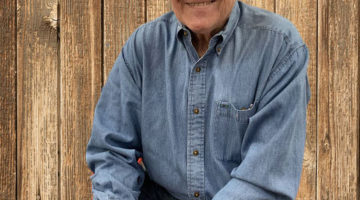As eloquent in its praise of G-d as any verse of Psalms, Gidi Dar’s Ushpizin represents a first in the history of our people – a fully realized, wholly accessible, full-length feature film steeped in authentic orthodox culture that doubles as an uplifting spiritual experience. To say that Ushpizin is a movie about Hasidic Jews or starring Hasidic Jews (which is the case) is like saying Anna Karenina is a book about Russians. Yes, it is startling to be transported to Meah Shearim via the big screen and comprehending a subtitled movie without the subtitles (film’s in Hebrew) always throws me, but the initial shock subsides early enough, and what remains is a story that – as simply as I can say it – speaks directly to the Jewish soul. With all my auspicious yearnings to broaden my horizons and appreciate all cultures, and although I would have told you last week that as a human being sharing one humanity we can relate to all stories because emotions are universal, it took a movie about a Breslaver, his wife, and their Sukkot guests to prove me wrong. NEVER have I understood a movie, a character, a moment, an image on screen on a more deeply felt, profound level than with Ushpizin. And the reason why is stark and chillingly obvious – Ushpizin and I share a G-d. Whether that sounds unnecessarily esoteric or like the words of an unsavory fundamentalist, it remain the inescapable truth.
With this movie, celebrated Israeli director Dar reunites with his leading man for the first time following star Shuli Rand’s chozar beteshuvah status. Think of it as Scorcese and DeNiro making their first movie together after DeNiro had left the business to pursue a calling as a Buddhist monk. This premise sounds disturbingly familiar though. We have seen it just recently with rapper turned pastor, Mason “Ma$e” Betha, who left the music industry for his maker only to return purportedly to make a clean, kosher album. The cynics and nay-sayers rejoice as man compromises his religious ideals and objectives to get back into the spotlight. As man finds no satisfaction in the ruchniut he embraced, and must wander callously back to the gashmiut. What a joy it is therefore to watch Shuli Rand maintain his integrity and prove them wrong. Ushpizin makes no compromises when it comes to halachah or hashkafa. The dress is tzanuah, the language immaculate, the only message: emunah and bitachon. Shuli, his real life wife, Michal Bat-Sheva Rand, and Gidi Dar manage to – and I can’t believe I’m going to write this – infuse some level of kedushah into the celluloid and deliver some sort of cinematic mizmor.
The plot is about as ambitious as any Chassidic tale. A poor, barren couple have no money for Sukkoth meals, let alone a sukkah or the arba’ah minim. Tefilah and emunah have become their only solace and with pure hearts they pray for a miracle in the most shattering scene in the film and….miracles happen. In addition to this, there are subplots involving a stolen sukkah and a larger and somewhat flawed storyline involving two uncouth guests (ushpizin means guests), one a former friend of Rand’s Moshe. You see Moshe is a ba’al teshuvah and used to be a rough character in his prior incarnation.
Naturally, mainstream movie fans will find the pace and the story a bit under-whelming in that it does not offer a suspenseful plot device or over-the-top characterizations (and also because it is very, very culture specific). The beauty here, again, is that for the orthodox set, Ushpizin keeps it splendidly real. Our protagonists are simple faith driven Jews attempting to carve out an existence and a relationship in the age of hester panim.
In our day, where lessons are disseminated from television, and the conventional mesorah is transmitted mainly though film, Ushpizin marks a significant evolution of Orthodox education. It can be now legitimately asked: Why read mussar when you can see, feel, and hear it on screen, in a format that appeals to the masses? Obviously one quiet movie does not a Pirkei Avot make (although I did hear Mesilas Yesharim is panicking), but it does represent the paradigm for all future religiously responsible cinema. Ushpizin, from an artistic, critical perspective – Judaism aside – is a well acted, believable, involving motion picture, made with tremendous insight into its subject matter. From the uniquely Jewish angle, it could only have been made the way it was made. The characters are believable when they call out to Hashem from their tormented souls because…THEY HAVE called out to Hashem in the past. These “actors” aren’t emulating a love of mitzvot – they LOVE mitzvot. And, what can I say? The part of me that is connected with that, the part of me that relates, was incredibly moved.
I guess that is the bottom line: An orthodox Jew will identify and thereby raise the level of the movie to something beyond the temporal film experience. What I found disarming after seeing the movie is that it was promoted at the Festival as a comedy, which tells you a bit about the chasm between Chasidim and everyone else. While there are humorous moments sprinkled here and there, I found the film deadly serious, even uncomfortably so. Perhaps the truth and final effect of Ushpizin rests in its beholder. Much like any religious activity such as seder, minyan, chavrusah, candle lighting, or dunk in the mikvah, the spiritual value and potential of the experience depends largely on what you bring to the table.
Interview with Director Gidi Dar
After the premier at the festival – the actors and director took some questions from the standing ovation audience: (paraphrased)
How were you able to pull off shooting a full length in the heart of Meah Shearim?
Dar: It was met with definite apprehension from the neighborhood at first, but after the community began to see all of the actors were friends – neighbors, real religious Chasidim, they realized that this was going to be done with the complete and utmost respect.
How, if any, has this film had an effect on the very diverse and often clashing secular and religious Jews in Israel?
Dar: Unquestionably, this has opened the eyes of the secular Israeli to see a real slice of life of the religious Chasidic Jew – the beauty and comedy of every day life. The film was incredibly well received by both secular and religious in Israel, and it has brought the country together in a way that’s never been done before
Is this the first movie that Chasidic Jews were able to see in the theatres?
Dar: As far as we know, this is the first movie that Chasidim went to see in large numbers – we also know from the large amount of feedback we received that there was a tremendous sense of appreciation for this film. We hope that this type of positive film will continue to encourage more films like it
Is there a reason why you portrayed the leading actress as such a strong character? Isn’t that a bit unconventional for a Chasidic women?
Dar: Absolutely not. Anyone who knows an Orthodox Chasidic woman – knows and understands that this type of strong and courageous woman is the epitome and center of Jewish orthodox family. This is why this film is so important. This was done intentionally to show what real life family life is like in the orthodox world. Michal did a really wonderful job.
(For Shuli and Michal Rand) What effect has the tremendous popularity of Ushpizin in Israel had on your lives?
Shuli: We’ve had to move out of the community (crowd laughs) –
Michal: Our children have reached the popularity status of a celebrity – almost to the level of a Gadol Hador’s – a great rabbi’s – children. (crowd cracks up) People stop us everywhere we go – and tell us how much they loved the movie. We are really proud of it and that it has had such a positive effect on so many Jews in so many ways.
Shuli: People have stopped me and asked me for my Special Fries! – (crowd laughs – reference to his character’s signature dish in the film)
The crowd flanked the director and actress with many other questions, meanwhile lead actor and real life chasid, Shuli Rand ducked out to daven maariv with the many religious Jews at the Tribeca screening including bangitout.com’s editor, Isaac Galena – who reported “After the minyan, people were crowding around the lead actor, Mr. Rand, to shake his hand and say ‘Yasher Koach’ as if he just had gotten an aliyah in shul Saturday morning. The scene was borderline comical being in the middle of a film festival. But Mr. Rand handled himself with incredible humility and professionalism – undoubtedly, he was thrilled by the overwhelming outpouring of positive feedback he received that night, but looking at the warm smile on his face after he prayed, I suspect he was equally as, if not more, overjoyed by the fact he had been able to daven maariv with a minyan at the film festival. It is that level of sincerity that makes this actor and this movie something far more extraordinary than anything ever presented on a Hollywood screen.”









